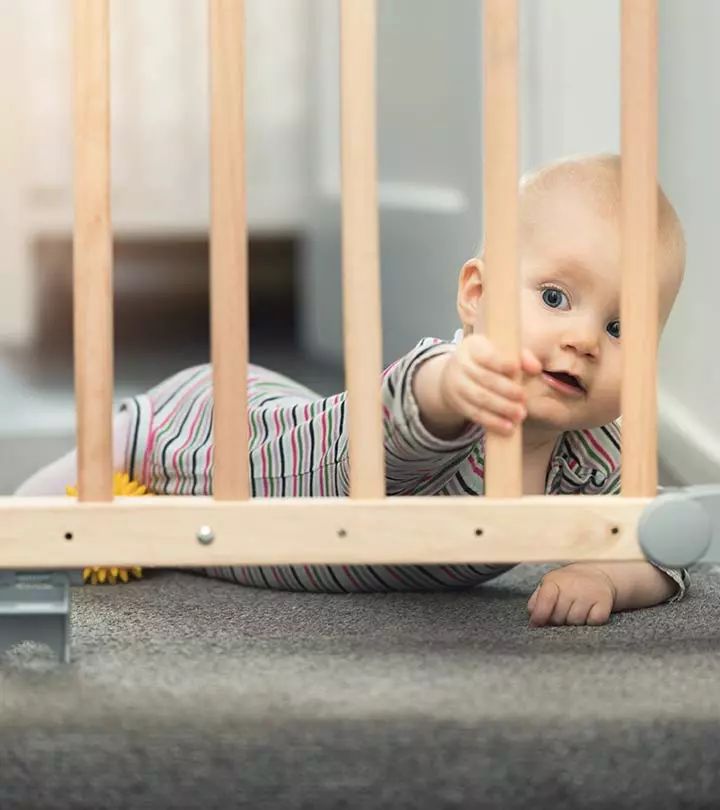
Image: Shutterstock
As much as you’re enjoying your role as a parent and your little one is the apple of your eye, there will be times when you face a challenging disciplinary issue — when your child talks back. It can make you furious and sad at the same time, mainly because the same child can be such an angel at other times. However, this is a normal part of parenting and your child’s development. No way should you resort to physical violence to discipline your little one. Physical violence at an early age has been linked to many psychological effects from delinquency and child aggression to spousal assault tendencies in the future. A better way would be to adopt constructive approaches which ensure the healthy development of kids (1). This requires more patience and involvement from the parents’ side but the rewards are also better. The earlier you curb your little one’s habit to talk back and revolt the better. Here’s a bunch of things you can do to deal with your child when the brat in them surfaces:
1. Don’t Lose Your Cool

Image: Shutterstock
It’s easy to lose your temper when you see your little one talk back at you. Yes, if anyone can push your buttons, it is your child, but at times like this, it is imperative that you stay composed and not retort with a yell or a threat. As parents, we often feel like we are entitled to control and boss over our children, but the truth is that they are an individual in their own right. Yes, they need to respect you, but it is also crucial for you to respect them.
When you begin to retaliate against their behavior or actions arrogantly and angrily, your child will observe this and think that the way to deal with conflicts is to trade angry words and unfair actions. They mimic what they see and model our behavior. Therefore, instead of losing your cool, keep calm, take a few deep breaths, and maybe go to another room when you feel any anger. You can deal with your child when you are in a better frame of mind.
2. Communication Is Key

Image: Shutterstock
When your child talks back, how about responding in a civil manner and having a decent one-on-one conversation with them? Talk to them and find out what they want to say. And while you’re at it, tell them what you feel and think as well. Give them the freedom to express their thoughts and feelings, provided they do so in a well-behaved way. When they begin to talk back, sit them down and tell them that you’re willing to listen to what they have to say, but they will have to try a more amicable approach if they want your attention. When a child sees you respond to their tantrums in a mature, compassionate way, they’ll back off and be more open to discussing things with you. What’s more, they might even regret behaving like tiny monsters when they see that you’re nice to them!
3. All Actions Have Consequences

Image: Shutterstock
We did mention that they might even regret behaving like tiny monsters when they see that you’re nice and understanding, but there could be instances where they don’t budge even when you play nice. It’s essential to learn a critical lesson that life throws our way: all actions have consequences. This is where you will have to stand firm and communicate to your child that bad behavior will not and should not be encouraged or tolerated, and since they behaved unacceptably, they’ll face the consequences. Consider options such as cutting back on screen time or having to do extra chores as a part of the consequences they’ll have to face.
4. Watch Out For Patterns

Image: Shutterstock
Children talk back, and it can be very disheartening, but it is also very normal. However, sometimes, there may be an underlying concern. It’s essential to watch out for patterns in case their behavior is due to something more serious. For example, does your child seem to misbehave, particularly after returning home from school? If so, maybe they’re facing problems at school such as difficulty with their studies or being bullied (2). The chances are that their behavior is an outlet or even a cry for help. This doesn’t give your child the right to behave a certain way; however, by looking for patterns and digging deeper, you will help your child better. Identify the reasons that could be prompting the frequent outburst from your child and you would be in a better position to address their concerns.
5. Respect Is A Two Way Street

Image: Shutterstock
It’s easy for adults to demand respect without returning it when it comes to their kids. That is not right. When your child talks back, the problem is with the way they’re communicating, not the fact that they’re communicating at all. In fact, when a child has an opinion on something, it’s a significant milestone. It shows that your little one can think for themselves and can look at things from a perspective that is different from yours. So, respect the fact that they have their own opinions and agree to disagree. Your child needs to know that you’re a safe space where they can get the respect they need for their views, but you’re not a punching bag that will tolerate cheeky retorts and jabs. As your child slowly starts understanding the difference between a tantrum and a respectful request, they will gradually behave the proper way to your relief.
6. Reward Them When Needed

Image: Shutterstock
Just like how you’re quick to throw in some extra chores or reduce screen time when they’ve misbehaved, it’s also essential to reward them when you see a positive behavior change. Maybe the first time your child demanded something, they tried so with arrogance and unnecessary remarks. However, the second time, your child politely asked for something and even explained why they needed it. Acknowledge this. Tell them you appreciate the behavior change and you’re proud of them. This way, they’ll know you see them not only when they goof up but when they’re doing good too.
When you’re trying to talk sense to your little ones, you would like to be patiently heard and understood. However, your kid might not listen to you and instead resorts to arguments. This can be quite challenging and frustrating for parents. Though resorting to a beatdown is an absolute no-no, you will have to find ways to fix such bad behavior. Not stopping such bad habits early will have a domino effect on the development of further confrontational behavioral habits. If you see that your child’s behavior and actions are getting worse and out of control, you may want to seek professional help. What are your thoughts on this? How do you deal with your child when they talk back? Let us know in the comments below!
References
- Physical Punishment Of Children: Lessons From 20 Years Of Research
https://www.ncbi.nlm.nih.gov/pmc/articles/PMC3447048/ - Long-term Effects Of Bullying
https://www.ncbi.nlm.nih.gov/pmc/articles/PMC4552909/
Community Experiences
Join the conversation and become a part of our nurturing community! Share your stories, experiences, and insights to connect with fellow parents.












